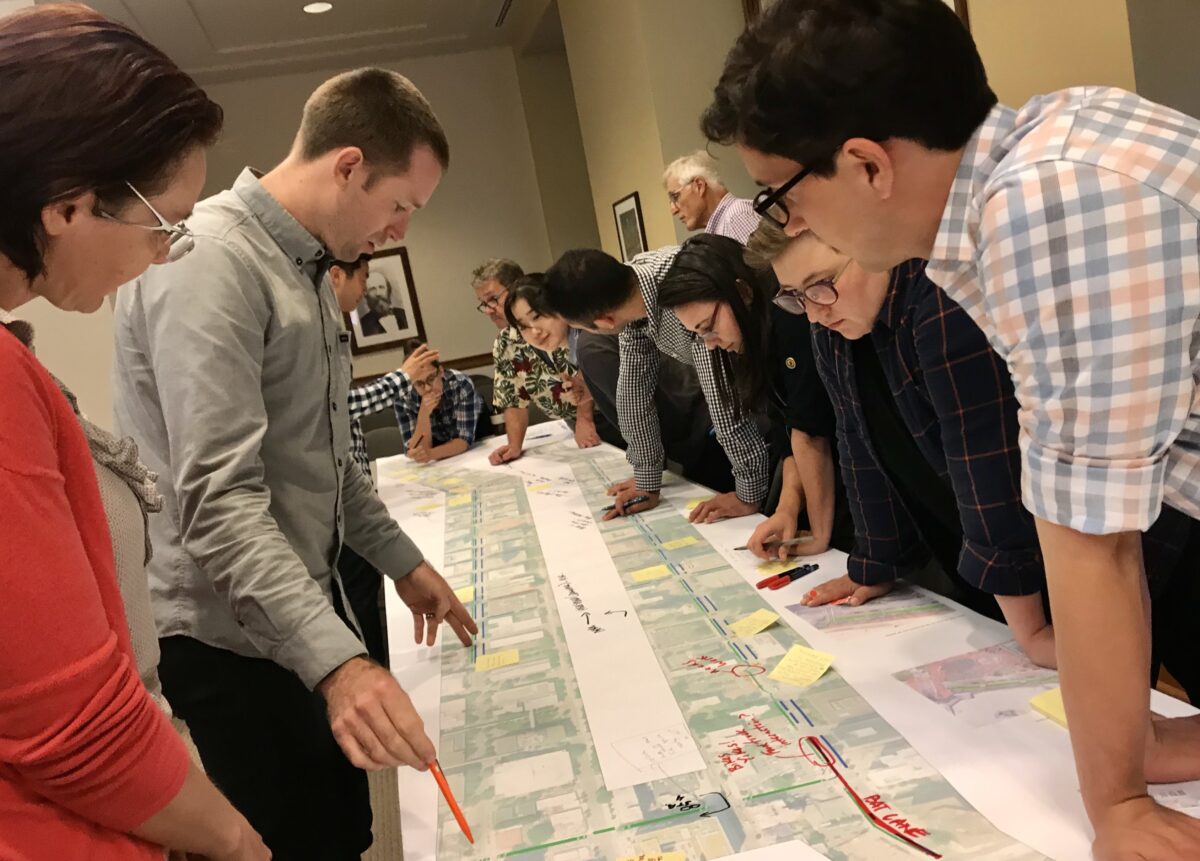
(Photos: Jonathan Maus/BikePortland)
The City of Portland has a long and proud legacy of working with the public on bicycle projects, policies, and programs. They formed a Bicycle Path Task Force in 1972 in order to develop the city’s first Bicycle Master Plan which passed one year later. The current iteration of that task force is the Bicycle Advisory Committee (BAC) which was formed by City Council ordinance in 1992 and has continued to meet every month since to advise the Portland Bureau of Transportation “on all matters that encourage and enhance bicycling.”
“I felt that the committee was an afterthought at PBOT.”
— outgoing BAC member
In many ways BAC meetings are ground zero for getting feedback on major transportation issues. I’ve only missed a few of the meetings since 2006 or so and have seen staff from every imaginable government agency stop by to vet bike-related policies and pick the brains of some of the best and brightest bicycling minds in Portland. The committee has made countless impactful decisions and input from its members have had an immeasurable impact on bicycling in Portland for decades.
But today the BAC has lost much of its relevance. For several years now there’s been a simmering sense among insiders that the committee wasn’t reaching its full potential. There have been repeated discussions (on and off the formal agenda) about how to make it more influential, dynamic, and diverse.
Unfortunately, not much progress has been made.
Advertisement
11 members recently left the committee and 13 new ones are being recruited to replace them (which would give the committee 19 total members). None of the outgoing members were at the end of their terms. They all chose to resign. According to comments shared in exit interviews, a majority of them said the BAC didn’t meet their expectations. Perhaps most damning? Only three out of nine departing BAC members would recommend the experience to their friends.
“Disillusioned with the committee’s lack of influence towards advancing the goals of the 2030 Bike Plan and Transportation System Plan.”
We obtained the results of the exit interviews through a public records request in order to learn more about what’s wrong with the BAC.
The overarching feeling from the nine interviewees is that they didn’t feel their feedback was respected by PBOT and that presentations to the committee were more of a checkbox required by agency staffers — rather than a truly collaborative opportunity that could influence project designs and policy language.
Asked why they they chose to step down, one respondent wrote, “Lack of belief that the City, including PBOT and City Council take the committee seriously as anything other than appeasement of vocal minorities.” Another person, who’d served for seven years, stated that they had become, “Disillusioned with the committee’s lack of influence towards advancing the goals of the 2030 Bike Plan and Transportation System Plan.”
Portland’s once-vaunted Bicycle Plan for 2030 has also gone through a struggle for relevance. One reason that plan — and bicycling as an issue more broadly — has fallen off Portland’s political radar is the perception among some folks in City Hall that cycling is still mostly the domain of wealthy white people.
The BAC has struggled for years with a lack of representation from people who are Black or come from other communities of color. There has also not been consistent representation from people who earn low-incomes and live far outside the central city. One outgoing member wrote that reason for leaving was to, “Allow more BIPOC and differently-abled individuals to serve.” “This committee needs to diversify to truly reflect the demographics of Portland,” they added.
Another former member said that as a “privileged cisgender, middle-aged white male” they didn’t feel they could add anything meaningful to the conversation: “It is difficult for most any other person to behave as I do feeling safe, comfortable and confident in conditions that are absolutely abysmal for most.”
Advertisement
“Our committee provided clear and practical advice aligned with the city’s goals for climate change, yet short-term budgetary needs and misjudged priorities won the day.”
The point of committees like this (PBOT also has pedestrian and freight advisory committees) is to influence project designs and policies. When asked directly if they felt their participation accomplished that, seven out of nine said it didn’t.
“No,” replied one person. “I think [my attendance] had a marginal impact. I think finances and politics has a bigger impact on city policies and programs.”
Another person had more specific feedback to this question: “Much time was given to plans that were either too early in the process or too late in the process to provide feedback that could be acted upon. Much of the PBOT staff was resistant to feedback and treated the committee as a checkbox on their to-do list.” That sentiment was echoed by another member who wrote, “It often felt that projects came to the BAC with a design in mind and there was little room for input.” “[PBOT] consistently failed to take the advice of the committee and continued to deliver projects that did not meet expectations,” wrote another.
The Hawthorne Pave and Paint project was cited by several people as an example of this phenomenon. “I don’t think we moved the needle much on specific projects. For example, the Burnside Bridge and Hawthorne Pave and Paint were areas I believe our committee provided clear and practical advice aligned with the city’s goals for climate change, yet short-term budgetary needs and misjudged priorities won the day.”
Here’s one comment that sums up these feelings:
“I was expecting the BAC to collectively have a greater impact in advancing the goals of the 2030 Bike Plan and Transportation System Plan to make Portland a safer and more comfortable place to bicycle for transportation. Unfortunately, I felt that the committee was an afterthought at PBOT, and the expertise on the body was either ignored or not seriously taken into consideration by staff.”
There are steps the City of Portland could take to revamp the BAC and perhaps event re-tool all their modal committees.
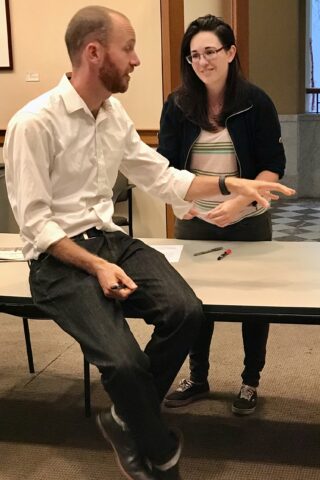
When outgoing members were asked how they’d improve the BAC, one person said there should be only two modal committees, one that focuses on micromobility (which they define as low impact, typically shorter distance travel) and the other that focuses on macromobility (which they define as higher impact and longer distance travel).
Another approach shared in the exit interviews would be to unify and beef up all three modal committees into a single, citywide transportation commission that has, “the power to make formal recommendations to staff and Council on the scope of PBOT projects and other initiatives.” More than one person expressed a desire to transition the committee into a group that has more political sway. “Needs to transition from advisory body to a different type of committee with actual 1) decision making power 2) budget or 3) oversight role,” they wrote.
It’s important to note that some of the outgoing members only know the BAC during Covid times with all meetings held online. Coronavirus fatigue likely figured into why some people left with a negative feeling about the experience. One person said they just couldn’t handle any more screentime, and several lamented the lack of social interaction. Making friends on the committee was the part of the experience almost all the interviewees said they liked most. Learning about projects and getting a deeper understanding of the people and policies that influence them was another benefit listed by several people as a positive.
While this article shares how the BAC faces a crisis of relevance and is poorly reviewed by some participants, the fact remains that it’s a vital part of Portland’s transportation advocacy ecosystem. As important as it is to understand and acknowledge its shortcomings, it’s equally important to find people who will step in and do the necessary work to reform and re-energize it.
Having a weak BAC is not an option. Please consider being part of the new guard that makes it relevant again!
If you’d like to serve on the BAC, applications are due on or before this coming Monday, February 28th. The first meeting with new members will be April 12th. You can learn more about the recruitment here and view the official volunteer position description here.



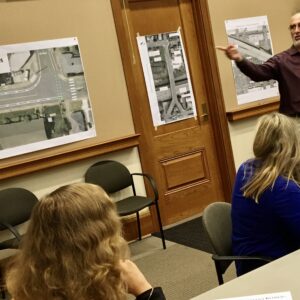
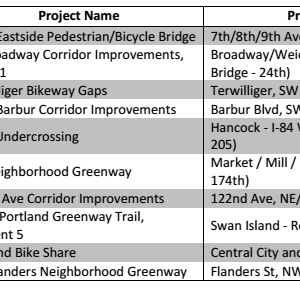
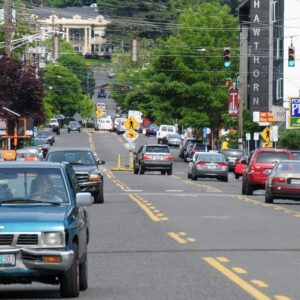

Thanks for reading.
BikePortland has served this community with independent community journalism since 2005. We rely on subscriptions from readers like you to survive. Your financial support is vital in keeping this valuable resource alive and well.
Please subscribe today to strengthen and expand our work.
PBOT has the power to make the BAC relevant or irrelevant. As with other forms of community input, they have clearly made their choice.
Really good article and kudos on sharing the exit interviews from outgoing BAC members.
If Portland is truly serious about getting to 25% mode share of trips by bicycle in 2030, elected leaders and senior PBOT staff have to meet BAC at least 25% of the way. That means stipends for people who need financial help to be able to serve, providing accurate capital project lists years in advance so BAC can weigh in on project scope rather than just minor details, transparent budgeting discussions, and of course much, much more authority to actually make informed choices that will get Portland to 25% of mode share in the next 10 years. Sharing power is hard but absolutely needed in the world we live in today.
I’m intrigued too by the idea of reforming the modal boards into a Micromobility Oversight Board for walk, bike, trike, wheelchairs, and scooters and a Macromobility Oversight Board for long distance bike routes and transit. Two MOBs.
I also have a question about BAC community-building. Has BAC been doing regular bike rides together? It’s a great way to meet and review infrastructure during COVID.
Yes they have done like 1-2 of these a year. And yes they are always very popular and fun and in the exit interviews several people mentioned them being the highlight of their tenure. You can find recaps of a few of them over the years in our archives.
2014 – https://bikeportland.org/2014/04/11/exploring-good-bad-ugly-and-new-bikeways-with-pbots-bicycle-advisory-committee-104397
2012 – https://bikeportland.org/2012/09/12/take-a-tour-of-the-central-city-with-pbots-bicycle-advisory-committee-77247
Policy Bike Rides are one of the highlights of BikeLoud. They are the reason we’ve been able to have in-person meetings throughout the winter and allow safe conversations during COVID. In addition to weekly Farmer’s Market rides, each of the 3 chapters of BikeLoud does a monthly Policy Ride followed by a meeting. People who bike tend to be people who want to MOVE. Can’t imagine community work getting done on screens. I’m glad BAC does rides too!
Portland was never serious about the 2030 bike plan as evidence by the lack of funding and the subsequent gutting of Portland’s meager active transportation funding by Wheeler and Novick (bizarrely beloved by many advocates). And, today, Portland does not even have dedicated active transportation funding.
Platinum –> Lead
I suppose organizing is about achieving the impossible but this seems detached from any realistic power mapping of Portland’s politics. To be blunt, the attempts to resurrect Portland’s long defunct bike plan reminds me of XR’s campaign for net zero by 2025 in that it plays well to activists but does little to convince the more skeptical majority.
PS: It’s my expectation that cycling modal share will continue to drop as the demographic groups most likely to bike for transportation (younger and moderate/low-income people) are priced out of Portland. I personally see little evidence that cycling advocates are willing to address how increasing inequality is a major headwind towards increasing active transportation mode share.
Soren can you explain more about your statement that Novick gutted funding? My understanding has always been that the gas tax that he basically fell on a sword to get through has provided much of the funding for expanding the neighborhood greenways network so it surprises me to hear someone say he is responsible for a net decrease in active transportation funding. I would like to understand more about this.
Sigh.
Wheeler and Novick gutted the specific active transportation budget tranche at PBOT and this led to the cancellation of multiple Bike Boulevard build outs, including the 4M and 100s. This happened prior to Novick’s shameful and corrupt deal with the PBA to drop a progressive income tax (which polled well) and switch to a regressive gas tax (which did not well).
And, BTW, multiple “car free” cycling advocates” were outraged that they would have to pay a progressive income tax so they literally celebrated Novick’s corrupt deal with the PBA. IMO, cycling advocacy is almost always anti-poor.
Then you simply have not been paying attention. By lumping PBOT active transportation spending into a generic “safety” category the bureau has obfuscated how much money it spends on active transportation and reneged on its promise to spend ~50% of these funds on active transportation projects.
PBOT has repeatedly refused to conduct audits despite being lambasted by the auditors office:
https://www.oregonlive.com/commuting/2021/09/portland-auditor-says-transportation-bureau-failed-to-closely-track-gas-tax-spending.html
https://www.portlandoregon.gov/auditservices/article/733093
The BAC is not the only committee that has functioned as a rubber stamp for PBOT’s failures and lies. PBAC has done nothing to address PBOT’s lack of accountability and its outright lying about how its spending “fix our streets” revenue.
I meant PBOT BBAC, not PBAC.
It was under Adams that the bike boulevard program was mostly gutted in 2011/12 – Novick later simply finished it off. In both cases it was cut when everything else was being cut too – the great recession lasted longer at PBOT than for the economy at large – and a whole slew of programs were slashed. I was there, part of the PBOT budget advisory committee, and I saw the cuts up front. In return for the cuts, SW and East Portland were able to get millions in improvements sooner rather than later.
In any given year, PBOT has about $4.5 million to $7 million in truly discretionary funding, everything else is more or less fixed in some funding pipeline or other. About 30% to 40% of the PBOT budget is related to BES one way or another, and a similar amount are for federal and state capital projects, and 15% or more is debt (a very typical rate for any DOT).
When Novick cut active transportation funding again it was reallocated to road paving/repair, according to my recollection.
PS: I can’t tell Wheeler and Hales apart. Dan Ryan too.
“If Portland is truly serious about getting to 25% mode share of trips by bicycle in 2030…”
spoiler alert – Portland is not serious about achieving this
What are some good non-governmental organizations where people can discuss cycling policy and collect information about what is needed in the community? This is the kind of thing I would like would like to be a part of, but I have struggled do find something.
One example is SWTrails which often focuses on paper street trails but covers PBOT and ODOT things, too. They helped to successfully change an Oregon law regarding paper street trails of which there are many in Portland and the metro area.
We won’t have the bike paths and bike lanes cleaned up and usable by 2030, who are they kidding…
PBOT (and Portland’s government at large) has a real opportunity to show its denizens that the goals and messaging set forth in glossy documents are not merely performative; that there is substantive work being done to empower the people. By making the BAC a body that has actual influence over pertinent matters, PBOT can start the healing process that this city badly needs. Cynicism is making the rifts deeper and silos more armored. We need to introduce compassion into all we do. Let’s hope folks within the bureaucracy are feeling this too.
This is a good followup to the SW Hamilton series by David Stein, particularly his third article.
Jonathan, have you found anything further about City of Portland’s discrepancy in its policy prohibiting BAC members to do any other bicycle advocacy, whereas it clearly allows the Portland Freight Committee to be composed of people working other jobs as freight industry advocates?
WTF. If true, that’s messed up.
Read the editor’s intro note on the article I linked to, and the comments. There’s no “if” but I do agree that it’s F’d up. It’s been 2 months since that post and I’m thinking that the “coming soon” info and any participation from PBOT people has passed the event horizon. Small wonder that a tinge of cynicism creeps into comments of those who’ve had skin in the game for many years, like Soren’s above and Fred’s below.
The link does not say that other forms of advocacy by BAC members is prohibited at all. That’s nowhere in there! In fact, some other BAC members are actually paid, professional alternative transportation lobbyists (for example, Sarah Iannarone).
According to Maus’ and Stein’s comments, it’s not Stein’s advocacy that has created the conflict, it’s the fact that he was “working” (volunteering, apparently) for BikePortland, which is a “news outlet.”
This is a paraphrase of what Maus wrote:
1. the City has recently prohibited public officials from talking directly to the media, and
2. the Office of Civic Life considers the BAC chair (Stein) a “public official” in some respect.
3. The City considers BikePortland a “news outlet”
4. Working for BP would require Stein to “talk” to BP…
Therefore:
Stein can’t both work for BP and be BAC Chair.
I can see why the City would have ethics concerns (not to mention messaging concerns) about some kinds of arrangements like this, though I seriously doubt Stein, Maus, or BP would be a particular risk. And the fact that Stein has volunteered, in both roles, reduces the ethical conflict, to my mind.
However, that’s not how the City sees it, and I can’t fault them for being careful, even if it seems a little overblown.
I’ll jump in here since my name is being invoked.
There are two separate issues at play in this thread: the short time I wrote articles, uncompensated, for this site, and the broader restrictions or lack thereof for public officials.
For the former the issue is that this site is considered media. Given that there are policies around how staff are allowed to interact with media it becomes challenging if I inquire about a project because would that be for the BAC or a member of the media? The theory was that it would make things tenuous at best and could cause communication to become restricted at worst. While the BAC bylaws only require that PBOT be informed of contact with the media (and doesn’t specifically regulate it) this was something of a loophole for a few hours. It wasn’t worth pursuing to the end, though the experience provided some insight nonetheless.
Now the Freight Committee and advocacy/lobbying more generally. The impropriety here, and this is my personal opinion, comes down to being on the clock. PFC meetings at 7:30-9:30am and pretty much everyone is representing a company or organization related to freight that comes with accompanying compensation related to their participation. The timing allows these individuals to maintain a roughly normal workday while receiving compensation from their employers and the ability to influence city projects and policy. For the BAC and PAC, even individuals who are employed by organizations related to each mode are effectively coming on their own time as the meetings occur 6-8/8:30pm. The timing interferes with personal time usually not spent working and even for those who do related work professionally it’s pretty explicitly off the clock. If the PFC were meeting outside of normal work hours it would probably go a long way towards removing the conflicts and impropriety that a lot of people feel toward this arrangement, even better if they aren’t being compensated by their employers for participation – this is likely an issue with 2040Freight as well since there are a mix of people from inside and outside the industry involved and it’s pretty clear who is volunteering and who is not, but I digress.
Tl;dr The PFC is inherently treated differently from the BAC and PAC due to the timing of the meetings and compensation of the members of each body. The ability of members to advocate outside of meetings is not particularly limited.
Thanks for stepping in, David. I’ll stand by my point that CoP has a huge, glaring discrepancy between how it treats freight advocates versus bike advocates. It’s true.
(Moderator, please delete the near-duplicate post of mine just below this. Something glitched and the first one disappeared before it was approved.)
Thanks for the update! It does seem like a glaring inequality baked into the meeting times.
So, not true.
No “if,” but yes, “F’d.” Read the editor’s note at the top of the article I linked, and its comments. It’s been two months since then and the “coming soon” for more about & even commenters from PBOT seems about past the event horizon. It’s no wonder long-time advocates with plenty of skin in the game start sounding slightly cynical in these comments, like Soren above this, or Fred below. CoP/PBOTisn’t living up to its word.
The BAC members who served all this time are/were indispensable. It was clear to most of them I hope that they held no real power, and PBoT administration was never going to use their input in any substantive way. Change–like we are seeing overseas and sometimes in NY–happens via money/power. Ydanis Rodriguez is the NYC DOT commish, and Antonio Reynoso is the BK pres because a lot of street safety activist money/time went into putting them there. So they listen to TA and get shit done when that group organizes around a public event.
Portland needs to retain these BAC members in whatever Bikeloud becomes. And bikeloud needs to become organized and well-funded. Only then can street safety advocates back council members/mayors who actually care about safe streets in any substantive, meaningful way. Activists are a dime a dozen in Portland; an organized, unifying, well-funded group with actual power to have an effect on city decisions doesn’t really exist yet.
Joann Hardesty just raised $200,000 for re election.
A big start to getting anything done would be to vote her out.
To add insult to injury, she is getting matching funds so we get to help her run
for an office she does not deserve by any means…
dwk,
We can tell you are not a fan of Commissioner Hardesty. I’d like to hear more about the reasons for your position instead of you just saying “vote her out”.
Here are some reasons I agree with this statement:
1. Hardesty has played an important role in the corroded relationship between the police and City Council that I believe is a large part of the upswing in crime we’re currently enjoying.
2. She has been very ineffective at moving PBOT in the direction I think it needs to go (more focused on active transportation, more responsive to the public). That’s not to say she’s done nothing, but in this time, we need to be moving much more rapidly.
3. I’ve heard Hardesty speak to community groups on many occasions, and over time, her remarks have become a litany of blaming others (her predecessors, her colleagues, the county, Metro, the state, and others) for the state of things. Maybe she’s right, but I don’t see that as a constructive way forward.
4. Her office is generally not responsive to questions and comments (a trait that other Commissioners share, sadly, but one I don’t like).
5. OCCL is floundering under her leadership. She’s right to give Eudaly a lot of the credit for destroying the bureau, but she’s been far too passive in fixing it.
Hardesty is smart, honest about what she thinks, doesn’t fit in a neat political box (a strong attribute), and seems to hold many of the same values I do, but she’s just not getting the job done. She’s not the leader we desperately need at this time.
I haven’t yet started researching her opponents, so there’s still a possibility I will support Hardesty if they are weak candidates. But I’ll be looking hard for an alternative.
Thanks Watts. This really helps me see where you’re coming from more clearly. I too have mixed feelings about her that are similar to yours. She’s a complicated figure and like you said, doesn’t fit neatly into political boxes.
Ditto Watts,, I am not a fan of Hardesty, Ryan , Wheeler, Mapps, all of them.
This is a failing city, you live here, do you not see that?
It is not just Portland failing, the trash and homeless tents that ODOT is not picking up is embarrassing. To say we look like a third world country is not fair to third world countries. I have no idea why they don’t. The state is not broke by any means.
I served on the BAC 2014-15, as well as the BBAC (bureau budget advisory) 2009-15, lobbying for East Portland with reckless abandon for the whole period.
PBOT is an engineer-dominated organization. The purpose of the BAC, PAC, and FAC is to lobby the city and PBOT on behalf of your organization or special interest group – it’s a city-sanctioned process, a necessary evil in a commission form of government. If you aren’t on the BAC to lobby, then you probably are going to be disappointed during your service. The city doesn’t want your so-called expertise – city planners already have more than enough competition in getting PBOT engineer’s attention without you around – if they wanted your help, they would have hired you already.
Glad to see you commenting again, David, you were gone for a while.
Covid-Delta medical complications nearly killed me, still in recovery mode.
I’ glad that you are recovering. I missed your voice here.
That’s terrible to hear David! But also glad to know you are in recovery mode. Take care.
Oh geez David, I noticed you weren’t writing, but Covid never occurred to me. I’m glad you survived and good luck with the recovery, your characteristic determination is an asset!
I had no problem surviving covid in January thanks to the J&J vaccine several months earlier, though the loss of smell and taste was disconcerting. It was the discovery that I had covid-induced type 2 diabetes that was shocking, not having any history of it even in my extended family. I apparently nearly died of undiagnosed diabetes according to my doctors (diabetic coma and septic shock were mere hours away) and now I have to give myself insulin twice a day and my vision is temporarily messed up. On the plus side, I lost 60 pounds over 3 months, my kidneys are fully recovered, and my current low carb diet is the healthiest I’ve ever had. There were additional related complications, but in general my condition may not have been as preventable at all even with reasonable safeguards or covid boosters, but there were things I could have done differently to mitigate what happened. The doctors think I may fully recover and eliminate the diabetes in a few months as long as I follow orders, take my meds, and bicycle a lot. Quite frankly, I’m lucky to be alive and still ambulatory.
There’s really no lesson here – crap happens, particularly during pandemics.
I served on the BAC from ~1991 through 2003, it was the same back then and I doubt anything is going to change much; I would not put myself in that position again and it’s no surprise no one else wants to either.
It’s sad – but not at all surprising – to see that BAC members have not been heard, since that’s also my experience of serving on advisory boards in Portland. It’s always The Illusion of Inclusion ©
My take on the history of advisory groups: In the 70s and 80s, Portland leaders really did want advice, and many leaders came from the advisory groups. But later leaders wanted to do what they wanted, so they kept the advisory groups (b/c they were popular) but stopped listening to them. Today we have a Public Involvement Industrial Complex ©, in which professionals funded by tax dollars run “involvement theater” programs to help us all feel as though we are involved, when in fact we aren’t. “Stick some more colored dots on those charts, why don’t you?”
JM, you must realize the irony in your article, where you catalog a long list of ways the BAC isn’t working – and then say the BAC is important and new people should sign up. How about some recommendations for fixing a broken process, instead of asking people to give their time to a fruitless endeavor?
Previous Bike Portland reporting on Commissioner Hardesty’s ignorance of the demographics of cyclists is a great example of the woes of the BAC’s reality: many disadvantaged people and people of color ride bikes, but they are apparently invisible to our civic leaders. Furthermore, these civic leaders are apparently discounting some BAC advice due to the race of the current committee members.
From the article:
While representation is often a laudable goal, safety improvements to Portland streets should not require that we further burden disadvantaged people by requiring their membership on an unpaid, frustrating, and ineffective Board. In fact, if the City refuses to make improvements without first dragooning less-civically engaged citizens (who are probably too busy making a living and caring for their families!), onto a Board, improvements will never happen.
For one thing, it’s hard to imagine a casual bike rider from East Portland (picture someone who rides out of necessity, perhaps without ever identifying as a “cyclist”, and may not even speak English) managing to get themselves onto this advisory board. Moreover, it’s infuriating to think that such a person should have devote their personal time to an unpaid advisory board for elected officials to recognize that their needs actually do exist.
It’s also infuriating to me that elected officials would simply ignore or disbelieve committee members who are doing their best to represent the interest of such disadvantaged riders, just because of the committee members’ own race.
This seems like a glaring injustice.